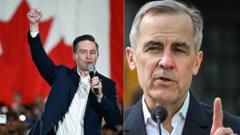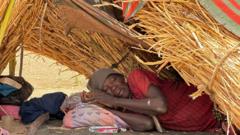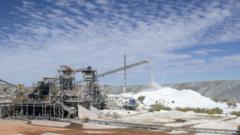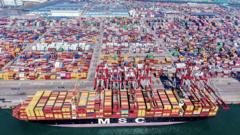As tensions escalate between South Africa and the US over the latter's criticisms of new land expropriation laws, ANC chair Gwede Mantashe champions his country's sovereignty, rejecting calls for punishment from within South Africa.
South Africa Asserts Sovereignty Amidst Rising US Tensions

South Africa Asserts Sovereignty Amidst Rising US Tensions
ANC chair Gwede Mantashe emphasizes South Africa's independence in the face of US criticisms over land reforms and race relations.
Article text:
In light of increasing tensions between South Africa and the United States, a prominent leader of the African National Congress (ANC) has publicly bolstered the narrative of South African sovereignty. ANC National Chair Gwede Mantashe declared, “We are a free country, we're a sovereign country. We're not a province of the United States and that sovereignty will be defended.” His comments were made during a speech on Freedom Day, as South Africa faces backlash from the US regarding its handling of racial issues and land expropriation laws.
The discord stems partially from an executive order issued by US President Donald Trump in February, which condemned South Africa's new expropriation regulations. Trump characterized these regulations as a mechanism for the government to "seize ethnic minority Afrikaners' agricultural property without compensation." In contrast, South African President Cyril Ramaphosa contends that the law is aimed at ensuring "public access to land in an equitable and just manner."
Despite the law enabling the government to take land without compensation, it applies only under specific conditions. The controversy surrounding Trump's order has also led to discussions about admitting Afrikaners into the US as refugees, labeled as "victims of unjust racial discrimination." Mantashe criticized South Africans advocating for the US to impose punitive measures, urging those calling for refugee status to follow through if they felt it necessary.
The tensions have sparked dialogue on social media as well, notably with Elon Musk airing his views on South Africa's ownership laws being "racist." The dynamics of land ownership remain contentious: while the apartheid era has long ended, white South Africans, a minority in the nation, still control a significant portion of private land and wealth.
In an attempt to mend relations, South Africa recently appointed a special envoy to Washington, Mcebisi Jonas, tasked with pursuing diplomatic, trade, and bilateral objectives. This gesture follows the expulsion of South Africa's ambassador, Ebrahim Rasool, from the US, who criticized Trump for engaging in "dog whistle" politics.
In light of increasing tensions between South Africa and the United States, a prominent leader of the African National Congress (ANC) has publicly bolstered the narrative of South African sovereignty. ANC National Chair Gwede Mantashe declared, “We are a free country, we're a sovereign country. We're not a province of the United States and that sovereignty will be defended.” His comments were made during a speech on Freedom Day, as South Africa faces backlash from the US regarding its handling of racial issues and land expropriation laws.
The discord stems partially from an executive order issued by US President Donald Trump in February, which condemned South Africa's new expropriation regulations. Trump characterized these regulations as a mechanism for the government to "seize ethnic minority Afrikaners' agricultural property without compensation." In contrast, South African President Cyril Ramaphosa contends that the law is aimed at ensuring "public access to land in an equitable and just manner."
Despite the law enabling the government to take land without compensation, it applies only under specific conditions. The controversy surrounding Trump's order has also led to discussions about admitting Afrikaners into the US as refugees, labeled as "victims of unjust racial discrimination." Mantashe criticized South Africans advocating for the US to impose punitive measures, urging those calling for refugee status to follow through if they felt it necessary.
The tensions have sparked dialogue on social media as well, notably with Elon Musk airing his views on South Africa's ownership laws being "racist." The dynamics of land ownership remain contentious: while the apartheid era has long ended, white South Africans, a minority in the nation, still control a significant portion of private land and wealth.
In an attempt to mend relations, South Africa recently appointed a special envoy to Washington, Mcebisi Jonas, tasked with pursuing diplomatic, trade, and bilateral objectives. This gesture follows the expulsion of South Africa's ambassador, Ebrahim Rasool, from the US, who criticized Trump for engaging in "dog whistle" politics.




















